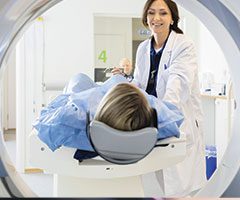Prostate Cancer
What is prostate cancer?
Prostate cancer is a slow-growing disease located just below the bladder that can cause significant problems if left untreated. Prostate cancer is the second most common cancer affecting males behind skin cancer. Men over the age of 55 are more likely to develop the disease. Cancer can become more aggressive and spread beyond the prostate gland. The survival rate greatly increases with early detection.
Prostate cancer treatment in Southwest Florida
The Lee Health Cancer Institute is helping patients all around Florida. If you are traveling from Naples, Bonita Springs, Estero, Cape Coral, Fort Myers, or Port Charlotte, we can help you navigate the next steps in treatment options. To learn more, call the facility at 239-343-9500
What are the primary symptoms?
Prostate cancer has increasing problems when left undiagnosed. Due to the location of the prostate gland it is difficult to detect early. Not all growths within the prostate are cancerous or indicate cancer. These are the symptoms men report when the disease has developed more cancerous:
- Painful urination or ejaculation
- Weak or inconsistent urine flow
- Erectile Dysfunction (ED)
- Blood in semen or urine
- More frequent urination at night time
Your primary care physician may perform a prostate specific antigen (PSA) test to measure the PSA levels within the prostate gland. This test reveals the elevated PSA level and may show signs of a noncancerous condition. This can be either prostate inflammation prostatitis or benign prostatic hyperplasia. A physician will order a biopsy if the PSA levels are elevated for the next steps in prostate cancer treatment.
How is prostate cancer diagnosed?
The most effective way to detect and diagnose is through a screening with your doctor. The first screening starts when you turn age 55 and beyond. Family history of the disease does indicate more likelihood along with a history of smoking or obesity. Screening for prostate cancer tests:
- Prostate Specific Antigen (PSA) Blood Test
- Rectal Exam
- MRI-Guided Prostate Biopsy
MRI-guided prostate biopsy
An MRI-guided prostate biopsy gives doctors a better detection of tumors and reduces the chance a serious disease will be missed.
-
Magnetic Resonance Imaging (MRI)
MRI is a painless imaging procedure used to help your physician diagnose a wide variety of conditions. In many cases, it provides different information about structures within the body that can’t be viewed through other imaging procedures.
How is prostate cancer prevented?
Most men develop prostate cancer at an older age for no known reason. Taking the healthy approach now will reduce chances of cancer growth. If you have a family history of prostate cancer then taking these additional steps can help limit your outcomes:
- Regular prostate screenings
- Daily/ weekly exercise routine
- Balanced & nutritious diet
- Never smoke or quit before it gets worse
Watch Our Youtube Channel
Cancer Support Services
-
Cancer Support Groups
Cancer support groups are gatherings that provide a secure environment for those impacted by the disease to talk about their feelings and experiences with other cancer patients.
-
Cancer Survivorship
Being a cancer survivor is a challenging journey. Long-term adverse effects might happen to those who have undergone cancer therapy. Lee Health Regional Cancer Center is here to help you. Schedule an appointment with an oncologist.
-
Nurse Navigation
Lee Health Cancer Institute nurse navigators are here to help the patient and family through their cancer journey. From the moment of diagnosis to the treatment plan, our nurse navigators are here for you.


















